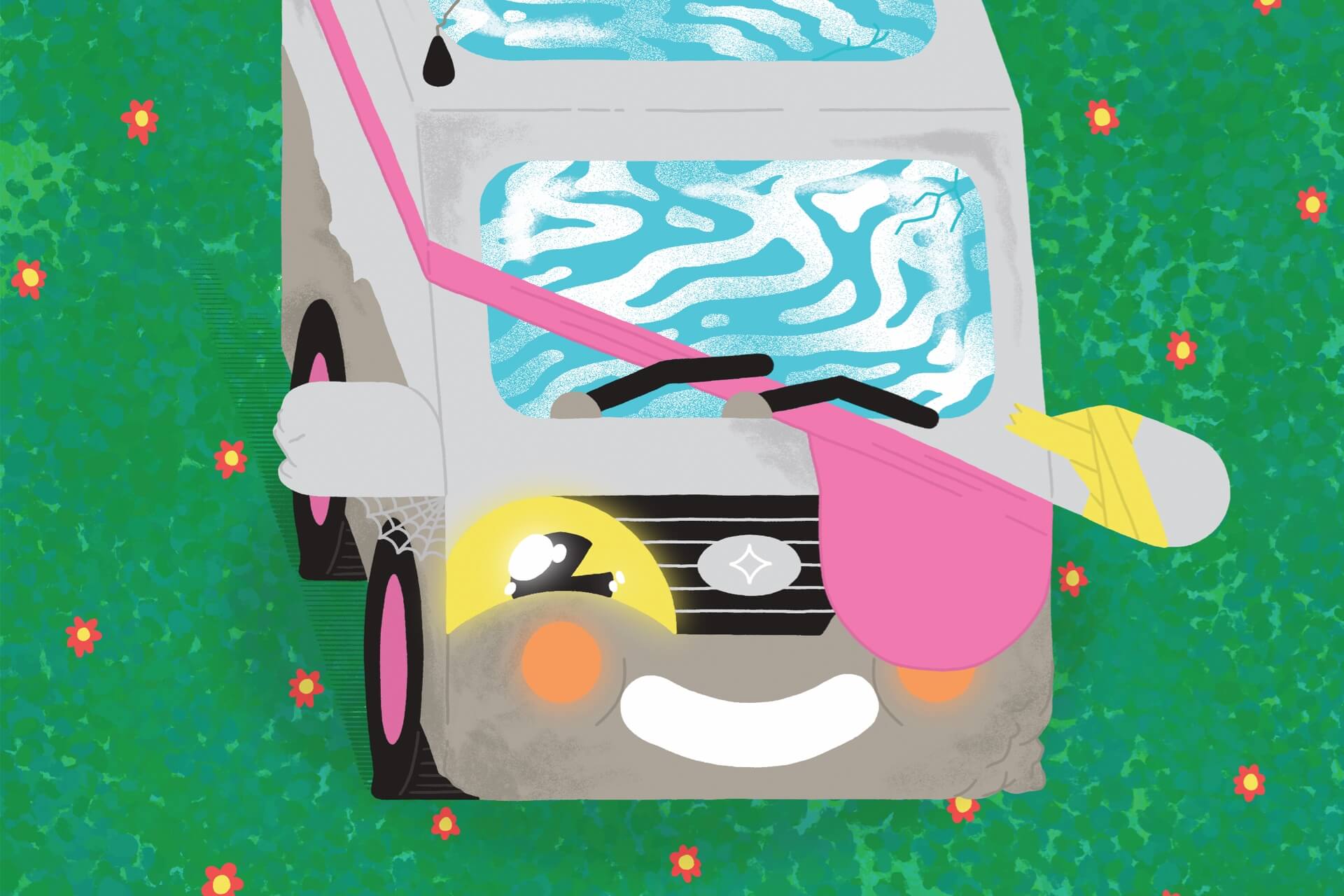Sep 5, 2022 Society
There is nothing like pulling up at a campground in a vehicular hunk of trash — diesel motor shuddering; grey, apocalyptic perfume dissipating through the kawakawa. Other campers give side-eyes from their super-sized caravans, either jealous or incredulous that the thing has a WoF. From the high cab, you look down on them and their shiny new things. The weka scatter off, but they’ll be back at dawn, pecking at the cracker that didn’t quite make it into your mouth.
Vanessa came as a package deal with my boyfriend. I’ve become a sort of repairer for him, lathering Wonder Soap on stained t-shirts, patching ripped shirts and sewing on burst buttons. This suits me. People who love me often bully me for my inability to throw things away, calling me “trash rat”. Now that we’re an economic unit, my boyfriend considers half the van a sort of inheritance for me, though one that seems to diminish rather than grow my finances.
She’s no ordinary van — as a Toyota HiAce Super Custom from 1998, she’s luxurious as well as intrepid, and was also marketed as the Toyota “HiClass”, back in the day. Owners of this model insist they’re coveted. Reluctant sellers ask for anywhere between $8,000 and $25,000, yet they seem to linger around TradeMe an awfully long time, valuable yet unsellable.
Partially scraped off decals on Vanessa tell admirers her motor is a full-time four-wheel-drive. And turbo. I don’t know what this means apart from that the mechanic charges extra “for the turbo thing”. Away from her tough engine, her interior is lush. Curvy, cushy seats are covered in cognac patterned velour. Dashboard panels are faux tortoiseshell with flaking gold trims. There’s 24 years encrusted in cracks and nooks — a bit of character.
We’ve given Vanessa a good life — she’s watched waves prod me and my board on to the rocks at Mangamaunu, seen the formations of Punakaiki, felt snowfall on Mt Ruapehu. She’s travelled 416,839 kilometres, the first few in Japan, but for the most part on the scenic roads of Aotearoa. Online calculators estimate she’s consumed over 50,020 litres of diesel, producing over 134,053 kilograms of carbon dioxide. In a series of portraits, Vanessa models next to trout-filled rivers, young kauri, the snowy peak of Aoraki. Sometimes, she flirtatiously extends her canvas awning, creating a seductive shadow. Other times, she is the tomboy at the campground, protecting the fire from wind, not minding that later she’ll smell a little smoky.
What I’m trying to say about Vanessa is that she might be old, clunky, emissions-heavy, but she isn’t a hunk of junk on wheels. She’s big — made of worn metal, plastic, polyester textiles, rubber and glass that should be kept out of the dump. If she were a piece of rubbish, it would be almost five metres long, one and a half metres wide and two metres tall. It would weigh over two tonnes. I don’t think any of her parts would be picked.
For me, being eco-friendly usually works out cheap — or maybe it’s vice versa. Well-trained purse strings pull me to make do, to borrow, to be resourceful, to frequent the dump-shop. We don’t need a new van. But in order to not buy a new one, we spend a lot of money at the mechanic. I can’t wash rust away, I can’t sew or patch up the motor. There are times we have the skills to save on repairs, or at least delay them. In January, I backed into my friend’s fence leaving the left rear light dangling from its socket and shattered on the driveway. We sellotaped the pieces together — no need to buy a new hunk of plastic until the next WoF inspection.
The last time we drove Vanessa to the mechanic, she made it only halfway through the door. Fred held up his hand, reached into his pocket and got out a key. With this, he began scraping at our DIY rust repairs under the windshield. A chunk of putty dislodged, exposing an embarrassing hole. “No, no, no. No WoF! Not safe!” Fred refused to look any further, sending us away to the panel beater. Vanessa’s full facelift cost $1,849.20 — considerably less than the previous WoF, when her side mirrors (big cute elephant ears) had to be stabilised ($160). This is the only part of the invoice I understand. The other list items include “F/Diff tube”, “Bush” , “CV Shaft” and “Rocker Cover”. There is also the time the head gasket blew in the Wairarapa on the way to a secret surf break. A hose from an old church provided enough cooling to get there, but after attempting a slow drive back to Wellington, the van had to be towed over the Remutaka Ranges to a mechanic in Petone, a pricey excursion.
I know, the government is about to offer cash for clunkers. Climate Change Minister James Shaw wants us out of old dirty cars, and into new green ones. Potentially the trade could instead be for public transport vouchers or an e-bike, but if you’ve ever cycled behind a bus, it will have put you off both. Shaw wants to recycle Vanessa’s steel — but our only steel mill doesn’t have the processing capacity. Instead she would probably be sent overseas. While the metal recycling industry insists they are about recovering a valuable resource, it’s hard to not think of all the things we “recycle” in other parts of the world: the piles of clothes no one wants, the plastic, the toxic electronics that people pick through in mountains. We dump our problems elsewhere. That’s not where Vanessa belongs. She belongs with us — in the bush, at the beach, on the roads, spreading her grey perfume.
–
This feature was published in Metro 435
Available here in pdf format.







